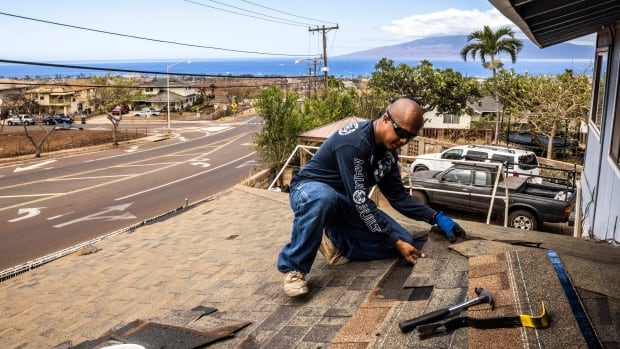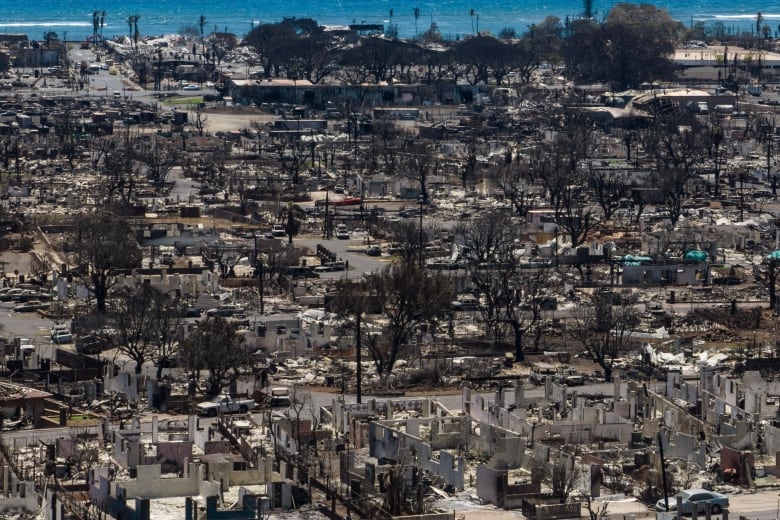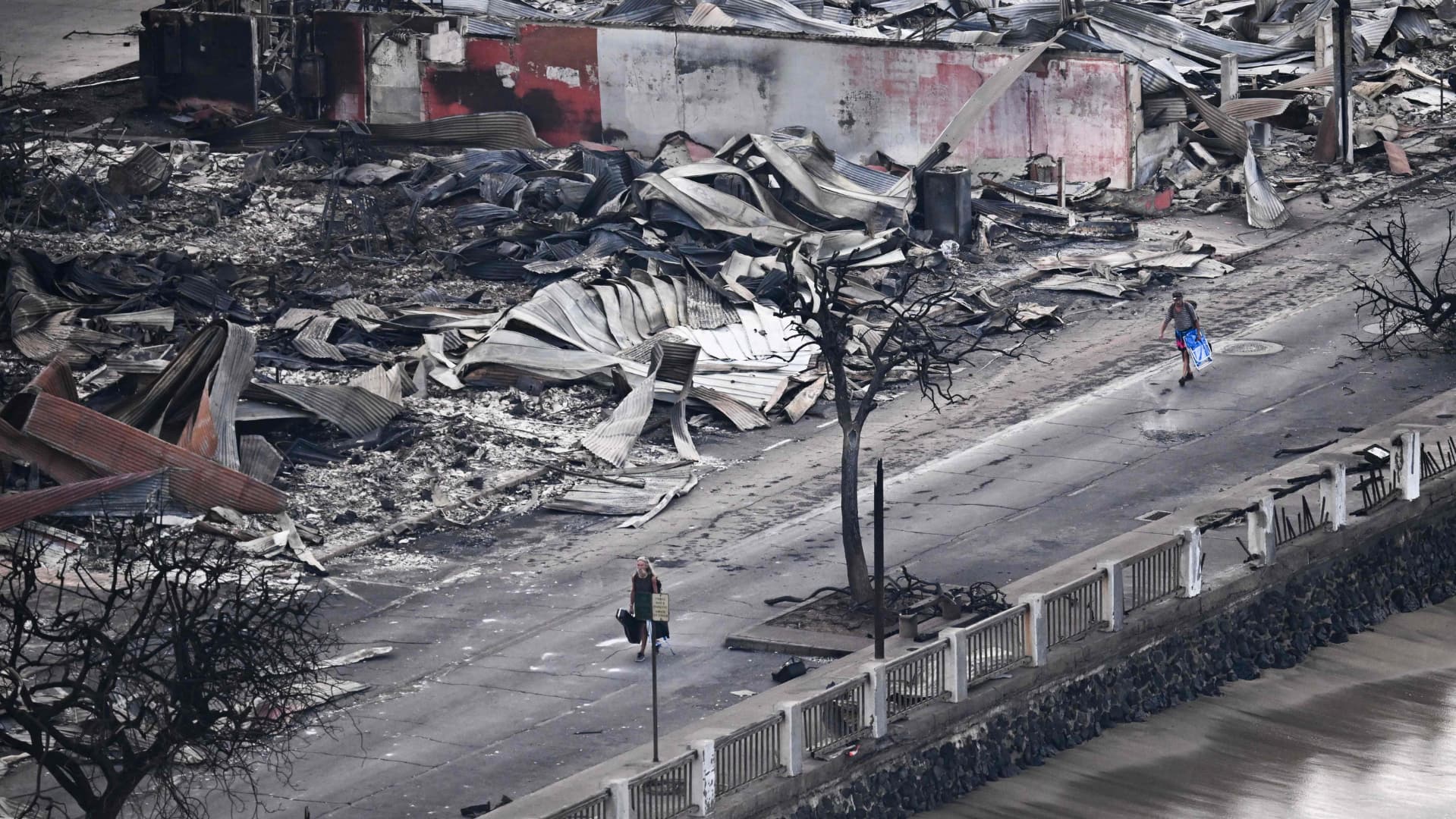
Hawaii Gov. Josh Green said Thursday his administration has opened several investigations into people who have allegedly made unsolicited offers for property in the fire-stricken Maui town of Lahaina in violation of a new emergency order.
Green prohibited such offers by signing an emergency proclamation on Aug. 19 aimed at preventing land in the historic coastal community from flowing into the hands of outside buyers. The order aims to give residents some “breathing room” as they decide what to do next, Green said in an interview with The Associated Press.
Even before the Aug. 8 fire, Lahaina was a rapidly gentrifying town and there’s been widespread concern since that Native Hawaiians and local-born residents who have owned properties in their families for generations might feel pressured to sell.
The fear is they would leave Lahaina, or Maui or the state, take their culture and traditions with them and contribute to the ongoing exodus of Hawaii’s people to less expensive places to live.
“We’ve seen that in a lot of different places in our country and in our world where people have lost everything but their land and someone swoops in and buys properties for pennies on the dollar,” Green said. “We want to keep this land in the hands of local people, and we want to give them at least a chance to decide whether they’d like to build back.”
Authorities say 115 people died in the fire, which tore through Lahaina in a matter of hours. About 1,800 to 1,900 homes were destroyed. The town of 12,000 people was home to many who worked in hotels and restaurants in nearby Kaanapali and Lahaina itself.
While the official number of missing is now at 388 people, Green separately told CNN that the FBI on Friday is expected to provide an update that will result in a “much tighter number for everyone,” possibly in the double digits. The number of missing was over 1,000 just over a week ago, but as cellphone service was restored and the displaced made contact, the number has fallen dramatically.
Many Lahaina wildfire survivors say they had no official warning before the blaze was upon them. As the number of people killed continues to rise, Andrew Chang explains why there are growing questions about the emergency response.
Full ban on sales ‘may not be doable’
Earlier this month Green, a Democrat, said he wanted to impose a moratorium on land sales in Lahaina to prevent people from being displaced. But the governor said a blanket ban “may not be doable” and he didn’t want to prevent people who are considering property sales from initiating those conversations.
The prohibition on unsolicited offers for property was a “de facto” moratorium, he said.
Green said people have reported unwanted offers to his attorney general, although he did not reveal how many investigations have been opened. Those found guilty of a violation may be imprisoned for up to one year and fined up to $5,000.

Lahaina resident Melody Lukela-Singh said she was disappointed the governor didn’t impose an outright ban as he initially said.
“Outsiders should not have the opportunity to grab land or properties. Because emotions are running high, so everyone is vulnerable,” Lukela-Singh said.
She spoke near her temporary lodgings a few miles from the site of her Front Street home, which burned in the fire. Lukela-Singh said she would not sell her land if any offers were made.
23:14Hawaii wildfires lay bare tensions between locals, tourists
“You know, it’s the only thing that we have left,” said Lukela-Singh, who is Native Hawaiian. She knows of three families, all Filipino, who are selling their homes and want to move away because they can’t handle the stress of seeing Lahaina burned to the ground.
State Rep. Troy Hashimoto, a Democrat who chairs the state legislature’s housing committee and represents the central Maui community of Wailuku, said the prohibition on unsolicited offers was a “nuanced” approach.
“You don’t really want to be bothering a lot of landowners, especially when they’re not in that frame of mind or ready to discuss it,” Hashimoto said. “But I wouldn’t want to stop a landowner if they are proactively wanting to make a move, right?”
Thousands displaced
The situation presents two competing interests, said Robert Thomas, the director of property rights litigation at California-based Pacific Legal Foundation. One is the U.S. Supreme Court has found people have a right to decide what to do with their property. The other is the government has an interest in making sure people aren’t preyed upon.
“It seems to me, and that’s just me observing this, that someone took a deep breath and said: ‘We can accomplish our goals of protecting the property owners here from predatory behaviour without taking the drastic and perhaps unconstitutional route of just throwing this blanket ban,”‘ said Thomas, who practiced property and land law in Hawaii for 35 years.
Green earlier floated the idea of the state acquiring land in Lahaina to ensure local people weren’t priced out of the rebuilt community, but said Thursday the state would not do this unless the community asked.
One possibility would be the state forming a land trust to buy properties from families who could repurchase them later.
“Any option to prevent sales to someone who’s just swooping in to take advantage of one of our people, we’re open to,” Green said.
About 6,000 people are staying in hotels and vacation rentals while waiting for the toxic waste left by the fire to be cleaned up and rebuilding to begin.
